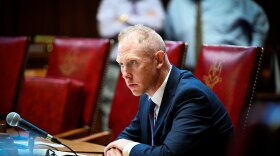The region's drought may be all about timing.
As climate change negotiations in Paris continue, another weather event is coming to the fore in Connecticut. The state is currently in the midst of a "moderate drought."
About 22 percent of the lower 48 states are in drought right now, a number which is biased in large part, by the severe drought in the western United States.
Speaking on WNPR's Where We Live, climatologist Mark Svoboda from the National Drought Mitigation Center said that drought, and its impacts on things like agriculture, are all about duration.
"Real estate's a lot about location, location, location, and droughts are all about timing, timing, timing," Svoboda said.
While not nearly as bad as the multi-year droughts out West, Connecticut has been lacking rain over the past 180 days.
According to the U.S. Geological Survey, despite rain over the weekend, precipitation in Connecticut is about 50 to 90 percent of normal. That's somewhere on the order of a two-to-12 inch deficit over the last six months, depending on where you live.
Gary Yohe, who studies economics and climate change at Wesleyan University, said drought is playing a significant role in international climate change conversations, like the one in Paris.
"Not only are drought conditions a source of concern, but the opposite of drought: extreme precipitation," said Yohe. "Particularly, after it follows the drought where the ground is very, very, hard and cannot absorb the water. It just creates enormous amounts of flooding."
Yohe said there are other "secondary" effects from drought, too, like an increased risk for wildfires and a harsher environment for growing food.





